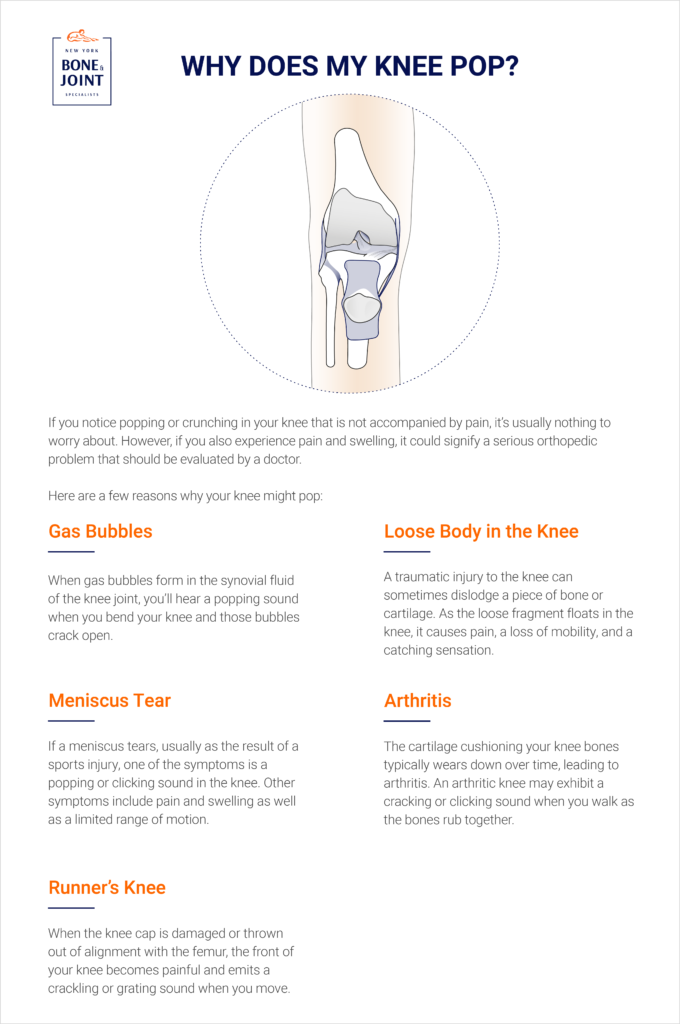That popping sound in your knee is usually benign — unless it’s accompanied by pain and swelling. Here’s what you need to know.
Does your knee ever pop or make a cracking noise? Don’t be alarmed. That sound you hear in your knee is called crepitus and it isn’t cause for concern if you aren’t experiencing other symptoms such as pain and swelling.
The knee is a hinge joint made up of a complex network of bones, ligaments, and cartilage that work together to allow you to flex your knee when you walk and go up and down stairs. Popping and cracking is only a cause for concern if your knee is painful and swollen or you think you may have suffered an injury.

Why Does My Knee Pop?
If you notice popping or crunching without any pain, it’s usually nothing to worry about. However, when the sound is accompanied by pain and swelling, it could signify a serious orthopedic problem that should be evaluated by a doctor. In those instances, a pop in the knee could mean you’ve suffered a sudden trauma to the joint, an overuse injury, or degeneration of the knee due to long-term wear and tear.
Here’s an overview of five reasons your knee might crack:
- Gas Bubbles. The bones in the knee are protected by synovium, or connective tissue that covers joints and tendons, and synovial liquid. When gas bubbles form in the synovial fluid, you’ll hear a popping sound when you bend your knee and those bubbles crack open. Everyone hears an occasional knee pop, so unless you also have joint pain, you don’t need to see a doctor.
- Meniscus Tear. The knee joint connects the thigh bone (femur) and the longer bone of the calf known as the tibia via ligaments and two pads of cartilage called menisci. The menisci act as cushions between the bones. If a meniscus tears, usually as the result of a sports injury, one of the symptoms is a popping or clicking sound in the knee. Other symptoms include pain and swelling as well as a limited range of motion. Although meniscus tears typically don’t heal on their own, physical therapy along within a program of icing, compression, and propping up the knee will reduce the pain and help you get moving again.
- Runner’s Knee. Also referred to as patellar chondromalacia or patellofemoral pain syndrome, runner’s knee is seen quite often in runners and other athletes. The patella, or kneecap, is the arch-shaped bone at the front of the knee. When the patella is damaged or thrown out of alignment with the femur because the muscles surrounding it are too tight or loose, the front of your knee becomes painful and emits a crackling or grating sound when you move. Fortunately, runner’s knee responds to a program of rest, physical therapy, bracing the knee, and anti-inflammatory medication. Surgery is rarely recommended for the condition.
- Arthritis. The cartilage cushioning your knee bones wears down over time, leading to arthritis. Arthritis can affect any joint, but in the knee it’s marked by pain, swelling, and stiffness in the joint. An arthritic knee may also exhibit a cracking or clicking sound when you walk as the bones rub together. Depending upon the severity of the arthritis, the condition is treated either with physical therapy to rebuild the muscles and ligaments in the knee, or surgery. Surgery for knee arthritis can be an arthroscopic procedure to repair the cartilage or a complete knee replacement.
- Loose Body in the Knee. A traumatic injury to the knee can sometimes dislodge a piece of bone or cartilage. As a loose fragment floats in the knee, it causes pain, a loss of mobility, and a catching sensation. Although physical therapy and anti-inflammatories reduce pain, a brief arthroscopic operation to remove the loose object is the recommended approach.
Treatment for Knee Pain
If you’re suffering from persistent knee pain and instability, the physicians and physical therapists at New York Bone & Joint Specialists can get your knee healthy again. We are experts in diagnosing joint disorders and will plan a treatment regimen based on your individual needs. Contact us today for an appointment.




